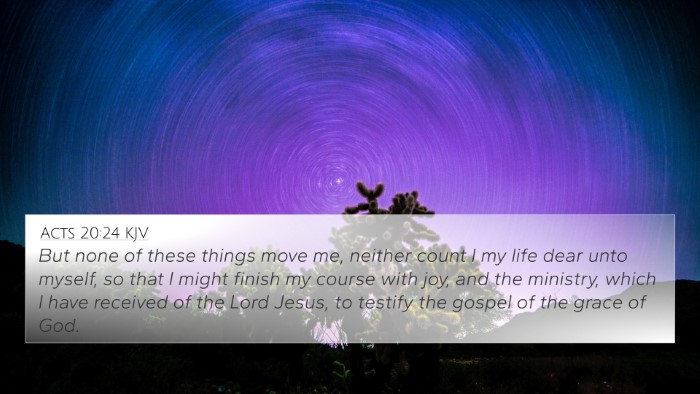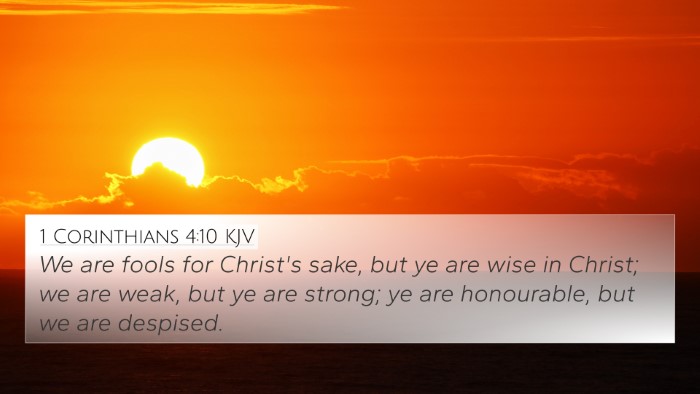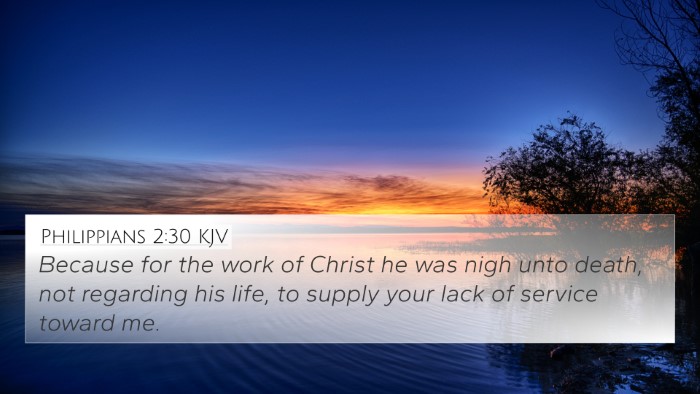Understanding 2 Corinthians 4:12
In 2 Corinthians 4:12, the Apostle Paul declares, “So then, death is at work in us, but life is at work in you.” This verse encapsulates profound theological themes concerning suffering, service, and the duality of death and life intrinsic to the Christian experience. Below is an in-depth examination of its meaning, drawing from respected public domain commentaries.
Contextual Overview
The Apostle Paul wrote this letter to the Corinthians to address challenges and affirmations within their community. This specific verse highlights the paradox of Christian ministry—wherein the sufferings of the apostles are ultimately for the benefit of the believers. It exemplifies how their trials lead to life for others.
Commentaries Insight
-
Matthew Henry emphasizes the idea that the sufferings of ministers result in the spiritual livelihood of the church. He articulates that the hardships they endure are not just personal but are transformative, fostering growth in the faith of others.
-
Albert Barnes provides a connection to the overarching theme of self-sacrifice in ministry. He indicates that apostles endure persecution and hardship with the hope that their sacrifices will yield spiritual life in those they serve.
-
Adam Clarke explores the contradiction presented in the text—the death in the apostles leads to the life of believers. He points out that the physical afflictions faced by Paul and his companions are in service of a greater spiritual purpose, suggesting a continual cycle of giving and receiving within the body of Christ.
Thematic Bible Verse Connections
As we explore the themes within 2 Corinthians 4:12, it becomes clear that they resonate with many other scriptures, providing a rich tapestry of inter-Biblical dialogue regarding life, death, and ministry. Below are some significant cross-references:
- Romans 8:28 - Highlights the concept that all things work together for good for those who love God, reflecting the ultimate purpose behind trials.
- Philippians 1:20-21 - Paul discusses the connection between the suffering of the body and the glory of Christ, stating, “For to me, to live is Christ, and to die is gain.”
- Colossians 1:24 - Paul mentions filling up what is lacking in Christ’s afflictions, reiterating the theme of suffering for the sake of the church.
- 2 Timothy 2:10 - "Therefore I endure everything for the sake of the elect, that they also may obtain the salvation that is in Christ Jesus." This affirms the sacrificial nature of ministry.
- John 12:24 - "Unless a grain of wheat falls into the earth and dies, it remains alone; but if it dies, it bears much fruit." This verse echoes the transformative nature of death leading to life.
- Luke 9:23 - Jesus calls for self-denial, teaching that taking up one’s cross is essential, aligning with the suffering in 2 Corinthians 4:12.
- 2 Corinthians 1:5 - Paul speaks of the sufferings of Christ abounding in us, which leads to the comfort we can share with others.
Connections Between Bible Verses
The interconnectedness of scripture is a vital tool for understanding the depth of verses such as 2 Corinthians 4:12. Understanding how this verse relates to others can enhance belief and practice within the life of a Christian. The themes of endurance, suffering, and the impartation of life serve as a bridge connecting various doctrines across the Bible.
Tools for Bible Cross-Referencing
To effectively engage in cross-referencing Bible verses, believers can utilize various tools:
- Bible Concordance: A helpful alphabetical listing of words found in the Bible, providing references for deeper studies.
- Bible Cross-Reference Guide: Compiles connections between verses that illuminate relationships and themes.
- Bible Study Software: Offers advanced search functions for locating related scriptures and themes quickly.
- Commentaries: Reading scholarly writings can highlight thematic links and varying interpretations which deepen comprehension.
Conclusion
In summary, 2 Corinthians 4:12 is a powerful reminder of the interconnected nature of suffering, death, and life within the Christian faith. By utilizing cross-referencing tools and appreciating the context enlightened by commentaries, one can derive a wealth of meaning from this verse, allowing for a greater understanding of its implications in the life of the believer.
As Christians seek to understand the connections between Bible verses, engaging with this verse through the insights from respected commentaries as well as the thematic relationships with other scriptures can greatly enhance one's spiritual journey.









